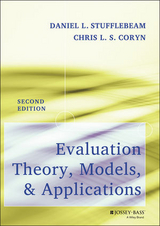
Evaluation Theory, Models, and Applications
Jossey-Bass Inc.,U.S. (Verlag)
978-0-7879-7765-8 (ISBN)
- Titel ist leider vergriffen;
keine Neuauflage - Artikel merken
"Evaluation Theory, Models, and Applications" is designed for evaluators and students who need to develop a commanding knowledge of the evaluation field: its history, theory and standards, models and approaches, procedures, and inclusion of personnel as well as program evaluation. This important book shows how to choose from a growing array of program evaluation approaches. In one comprehensive resource, the authors have compiled vital information from the evaluation literature and draw on a wide range of practical experiences. Using this book, evaluators will be able to identify, analyze, and judge 26 evaluation approaches. The authors also show how to discriminate between legitimate and illicit approaches based on application of the Joint Committee Program Evaluation Standards.
Daniel L. Stufflebeam, Ph.D., is Distinguished University Professor and Harold and Beulah McKee Professor of Education at Western Michigan University, Kalamazoo. He founded the Evaluation Center at Ohio State University in 1965 and was its director until 2002. Anthony J. Shinkfield, Ed.D., has served in numerous positions in education leadership, including assistant director, Research and Planning Directorate, Education Department of South Australia. He is currently involved in the evaluation of independent schools and universities in Australia.
Tables, Figures, and Exhibits. Acknowledgments. About the Authors. Introduction. PART ONE: FUNDAMENTALS OF EVALUATION. 1 Overview of the Evaluation Field. 2 The Nature of Program Evaluation Theory. 3 Standards for Program Evaluations. 4 Personnel Evaluation: The Ghost in Program Evaluations. PART TWO: AN EVALUATION OF EVALUATION APPROACHES AND MODELS. 5 Background for Assessing Evaluation Approaches and Models. 6 Pseudoevaluations. 7 Questions- and Methods-Oriented Evaluation Approaches (Quasi-Evaluation Studies). 8 Improvement- and Accountability-Oriented Evaluation Approaches. 9 Social Agenda and Advocacy Approaches. 10 Eclectic Evaluation Approaches. 11 Best Approaches for Twenty-First-Century Evaluations. PART THREE: EXPLICATION AND APPLICATION OF SELECTED EVALUATION APPROACHES. 12 The Evaluation Case: An Evaluation of an Innovative Housing and Community Development Project. 13 Experimental Design. 14 Case Study Evaluations. 15 Daniel Stufflebeam's CIPP Model For Evaluation: An Improvement/Accountability Approach. 16 Michael Scriven's Consumer-Oriented Approach to Evaluation. 17 Robert Stake's Responsive/Client-Centered Evaluation Approach. 18 Michael Patton's Utilization-Focused Evaluation. PART FOUR: EVALUATION TASKS, PROCEDURES, AND TOOLS AND THE METAEVALUATION IMPERATIVE. 19 Identifying and Assessing Evaluation Opportunities. 20 First Steps in Addressing Evaluation Opportunities. 21 Designing Evaluations. 22 Budgeting Evaluations. 23 Contracting Evaluations. 24 Collecting Evaluative Information. 25 Analyzing and Synthesizing Information 26 Communicating Evaluation Findings. 27 Metaevaluation: Evaluating Evaluations. Glossary. Name Index. Subject Index.
| Erscheint lt. Verlag | 17.4.2007 |
|---|---|
| Reihe/Serie | Research Methods for the Social Sciences |
| Zusatzinfo | Illustrations |
| Verlagsort | New York |
| Sprache | englisch |
| Maße | 185 x 239 mm |
| Gewicht | 1351 g |
| Themenwelt | Sozialwissenschaften ► Pädagogik |
| ISBN-10 | 0-7879-7765-9 / 0787977659 |
| ISBN-13 | 978-0-7879-7765-8 / 9780787977658 |
| Zustand | Neuware |
| Haben Sie eine Frage zum Produkt? |
aus dem Bereich



